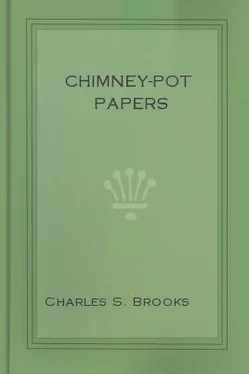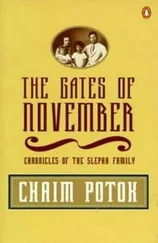Charles Brooks - Chimney-Pot Papers
Здесь есть возможность читать онлайн «Charles Brooks - Chimney-Pot Papers» весь текст электронной книги совершенно бесплатно (целиком полную версию без сокращений). В некоторых случаях можно слушать аудио, скачать через торрент в формате fb2 и присутствует краткое содержание. Город: London, Год выпуска: 1920, Издательство: New Haven: Yale University Press, Жанр: Юмористическая проза, на английском языке. Описание произведения, (предисловие) а так же отзывы посетителей доступны на портале библиотеки ЛибКат.
- Название:Chimney-Pot Papers
- Автор:
- Издательство:New Haven: Yale University Press
- Жанр:
- Год:1920
- Город:London
- ISBN:нет данных
- Рейтинг книги:4 / 5. Голосов: 1
-
Избранное:Добавить в избранное
- Отзывы:
-
Ваша оценка:
- 80
- 1
- 2
- 3
- 4
- 5
Chimney-Pot Papers: краткое содержание, описание и аннотация
Предлагаем к чтению аннотацию, описание, краткое содержание или предисловие (зависит от того, что написал сам автор книги «Chimney-Pot Papers»). Если вы не нашли необходимую информацию о книге — напишите в комментариях, мы постараемся отыскать её.
Chimney-Pot Papers — читать онлайн бесплатно полную книгу (весь текст) целиком
Ниже представлен текст книги, разбитый по страницам. Система сохранения места последней прочитанной страницы, позволяет с удобством читать онлайн бесплатно книгу «Chimney-Pot Papers», без необходимости каждый раз заново искать на чём Вы остановились. Поставьте закладку, и сможете в любой момент перейти на страницу, на которой закончили чтение.
Интервал:
Закладка:
Charles S. Brooks
Chimney-Pot Papers
To Minerva, my Wife

THE CHIMNEY-POTS
 y windows look across the roofs of the crowded city and my thoughts often take their suggestion from the life that is manifest at my neighbors' windows and on these roofs.
y windows look across the roofs of the crowded city and my thoughts often take their suggestion from the life that is manifest at my neighbors' windows and on these roofs.
Across the way, one story lower than our own, there dwells "with his subsidiary parents" a little lad who has been ill for several weeks. After his household is up and dressed I regularly discover him in bed, with his books and toys piled about him. Sometimes his knees are raised to form a snowy mountain, and he leads his paper soldiers up the slope. Sometimes his kitten romps across the coverlet and pounces on his wriggling toes; and again sleeps on the sunny window-sill. His book, by his rapt attention, must deal with far-off islands and with waving cocoanut trees. Lately I have observed that a yellow drink is brought to him in the afternoon—a delicious blend of eggs and milk—and by the zest with which he licks the remainder from his lips, it is a prime favorite of his. In these last few days, however, I have seen the lad's nose flat and eager on the window, and I know that he is convalescent.
At another set of windows—now that the days are growing short and there is need of lights—I see in shadowgraph against the curtains an occasional domestic drama. tonight, by the appearance of hurry and the shifting of garments, I surmise that there is preparation for a party. Presently, when the upstairs lights have disappeared, I shall see these folk below, issuing from their door in glossy raiment. My dear sir and madame, I wish you an agreeable dinner and—if your tooth resembles mine—ice-cream for dessert.
The window of a kitchen, also, is opposite, and I often look on savory messes as they ripen on the fire—a stirring with a long iron spoon. This spoon is of such unusual length that even if one supped with the devil (surely the fearful adage cannot apply to our quiet street) he might lift his food in safety from the common pot.
A good many stories lower there is a bit of roof that is set with wicker furniture and a row of gay plants along the gutter. Here every afternoon exactly at six—the roof being then in shadow—a man appears and reads his evening paper. Later his wife joins him and they eat their supper from a tray. They are sunk almost in a well of buildings which, like the hedge of a fairy garden, shuts them from all contact with the world. And here they sit when the tray has been removed. The twilight falls early at their level and, like cottagers in a valley, they watch the daylight that still gilds the peaks above them.
There is another of these out-of-door rooms above me on a higher building. From my lower level I can see the bright canvas and the side of the trellis that supports it. Here, doubtless, in the cool breeze of these summer evenings, honest folk sip their coffee and watch the lights start across the city.
Thus, all around, I have glimpses of my neighbors—a form against the curtains—a group, in the season, around the fire—the week's darning in a rocker—an early nose sniffing at the open window the morning airs.
But it is these roofs themselves that are the general prospect.
Close at hand are graveled surfaces with spouts and whirling vents and chimneys. Here are posts and lines for washing, and a scuttle from which once a week a laundress pops her head. Although her coming is timed to the very hour—almost to the minute—yet when the scuttle stirs it is with an appearance of mystery, as if one of the forty thieves were below, boosting at the rocks that guard his cave. But the laundress is of so unromantic and jouncing a figure that I abandon the fancy when no more than her shoulders are above the scuttle. She is, however, an amiable creature and, if the wind is right, I hear her singing at her task. When clothespins fill her mouth, she experiments with popular tunes. One of these wooden bipeds once slipped inside and nearly strangled her.
In the distance, on the taller buildings, water tanks are lifted against the sky. They are perched aloft on three fingers, as it were, as if the buildings were just won to prohibition and held up their water cups in the first excitement of a novice to pledge the cause. Let hard liquor crouch and tremble in its rathskeller below the sidewalk! In the basement let musty kegs roll and gurgle with hopeless fear! Der Tag! The roof, the triumphant roof, has gone dry.
This range of buildings with water tanks and towers stops my gaze to the North. There is a crowded world beyond—rolling valleys of humanity—the heights of Harlem—but although my windows stand on tiptoe, they may not discover these distant scenes.
On summer days these roofs burn in the sun and spirals of heat arise. Tar flows from the joints in the tin. Tar and the adder—is it not a bright day that brings them forth? Now washing hangs limp upon the line. There is no frisk in undergarments. These stockings that hang shriveled and anжmic—can it be possible that they once trotted to a lively tune, or that a lifted skirt upon a crosswalk drew the eye? The very spouts and chimneys droop in the heavy sunlight. All the spinning vents are still. On these roofs, as on a steaming altar, August celebrates its hot midsummer rites.
But in winter, when the wind is up, the roofs show another aspect. The storm, in frayed and cloudy garment, now plunges across the city. It snaps its boisterous fingers. it pipes a song to summon rowdy companions off the sea. The whirling vents hum shrilly to the tune. And the tempests are roused, and the windy creatures of the hills make answer. The towers—even the nearer buildings—are obscured. The sky is gray with rain. Smoke is torn from the chimneys. Down below let a fire be snug upon the hearth and let warm folk sit and toast their feet! Let shadows romp upon the walls! Let the andirons wink at the sleepy cat! Cream or lemon, two lumps or one. Here aloft is brisker business. There is storm upon the roof. The tempest holds a carnival. And the winds pounce upon the smoke as it issues from the chimney-pots and wring it by the neck as they bear it off.
And sometimes it seems that these roofs represent youth, and its purpose, its ambition and adventure. For, from of old, have not poets lived in garrets? And are not all poets young even if their beards are white? Round and round the poet climbs, up these bare creaking flights to the very top. There is a stove to be lighted—unless the woodbox fails—a sloping ceiling and a window huddled to the floor. The poet's fingers may be numb. Although the inkpot be full, his stomach may be empty. And yet from this window, lately, a poem was cast upward to the moon. And youth and truth still rhyme in these upper rooms. Linda's voice is still the music of a sonnet. Still do the roses fade, and love is always like the constant stars. And once, this!—surely from a garret:
Читать дальшеИнтервал:
Закладка:
Похожие книги на «Chimney-Pot Papers»
Представляем Вашему вниманию похожие книги на «Chimney-Pot Papers» списком для выбора. Мы отобрали схожую по названию и смыслу литературу в надежде предоставить читателям больше вариантов отыскать новые, интересные, ещё непрочитанные произведения.
Обсуждение, отзывы о книге «Chimney-Pot Papers» и просто собственные мнения читателей. Оставьте ваши комментарии, напишите, что Вы думаете о произведении, его смысле или главных героях. Укажите что конкретно понравилось, а что нет, и почему Вы так считаете.











